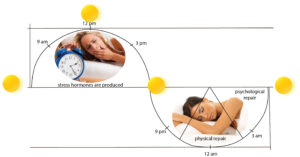Fatigue or just lack of sleep? Symptoms of chronic fatigue syndrome

Feeling overworked and tired from time to time is normal, and the symptoms and causes of temporary fatigue are easy to recognize. When you’re just tired and drained of energy, the grumpiness, inability to focus and physical tiredness usually go away if you get some sleep.
Sometimes the drowsiness occurs after working out hard, when you have a cold or a flu, or when you go several nights without getting enough sleep. If you’re going through a stressful period, you may experience symptoms that are specific to physical tiredness, from the typical lack of energy to temporary breathing difficulties, attentiveness and concentration problems, or even poor circulation, sweating or changes in body temperature.
All these can occur when your body is tired and your organs and systems need to rest and recover. But fatigue is different from this, and refers not just to the physical tiredness, but also to the mental lack of energy. Fatigue is usually described as a constant state of weariness that comes with low energy levels, concentration problems, lack of motivation and even depression.
Often, fatigue is linked with an unhealthy lifestyle; people who don’t practice any form of exercise or physical activity, have an unhealthy diet, spend most of their time indoor, consume large amounts of alcohol, smoke and don’t have a regular sleep schedule are more likely to experience fatigue as well.
Identifying and diagnosing fatigue can be challenging, as it’s a symptom and not a disease, and it doesn’t have an obvious cause always. In about a third of patients the cause is not found, and in numerous cases, fatigue is associated with other conditions, like anemia, COPD, diabetes, sleep disorders, infections or thyroid problems.
Other potential medical causes of fatigue include taking antidepressant medications or sedatives, suffering from cancer, liver or kidney disease, iron deficiency, heart failure, anorexia nervosa, arthritis, AIDS, fibromyalgia or autoimmune conditions like lupus erythematosus.
A complete patient history can help in identifying the underlying cause of fatigue, and in deciding whether it’s physical, mental or both. The typical complaints of someone affected by fatigue are that they lack motivation and don’t want to begin any activity, they tire easily once they start the activity, and they cannot focus or memorize things.
These symptoms can last for prolonged periods of time, and they are often described by patients as lethargy, feeling worn out, feeling exhausted, or having a general feeling of malaise. Women report fatigue more often, and this symptom is more likely to occur in people who live in poverty or who have a physical or mental illness.
Changing some lifestyle habits can help in preventing and overcoming fatigue. Those who often stay up late at night should have a more disciplined sleep schedule, and should avoid drinking too much caffeine or too much alcohol. Also, those who have a sedentary lifestyle should exercise more often and should avoid eating junk food. Spending more time outdoor can also help, and in lots of cases the patient is encouraged to disconnect from work and stressful life situations and take a few days off to just rest.
If fatigue persists for a long time, it can be classified as chronic fatigue syndrome (CFS). This diagnosis is made when the tiredness persists for more than 4-6 months and doesn’t have a medical cause, or cannot be explained by another diagnosis. Patients with chronic fatigue syndrome may display symptoms like:
- sleeping problems and insomnia
- painful lymph nodes and inefficient lymphatic drainage
- muscle and joint pain
- frequent headaches
- physical and mental exertion
- dizziness
- nausea
- throat infections or soreness
- difficulty thinking, concentration and memory problems
- general malaise
- palpitations without having any heart condition
If you have such symptoms, there are a couple of things you can do at home to improve your condition, besides the already mentioned lifestyle changes. Set realistic expectations for your personal and professional life, and schedule time to relax. Make sure you get enough restful sleep by avoiding watching TV or using the PC in the bedroom, and going to bed at a normal hour.
Drink more water to keep your body well hydrated and eat more fresh vegetables and fruits. Eating food that strengthens your immunity and is rich in vitamins and minerals can be helpful. Take a walk if you don’t have enough energy to exercise, but make time every day for physical activity, as it helps eliminating the stress and relaxing the body and mind.
Try to identify and name the stressors that are constantly present in your life and may be causing the fatigue symptoms: maybe it’s your work, your boss, some unresolved relationship problems.
Then, avoid using drugs or nicotine or alcohol as a solution to calm down and “forget about things”; instead, try talking to a therapist or schedule a counseling session, as talking about your problems and general lifestyle habits can be very helpful in identifying the root cause of mental and physical fatigue.
Have something to add to this article? Comment below or join our Facebook community and share your thoughts with us.













